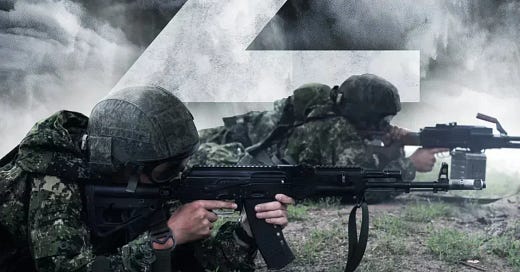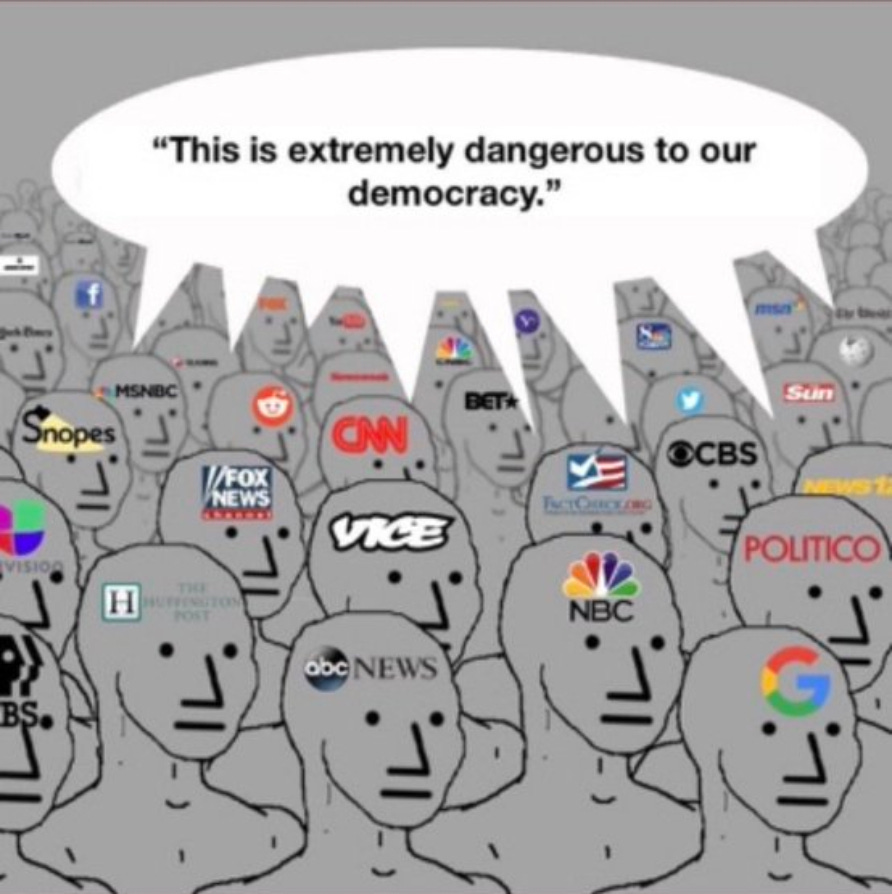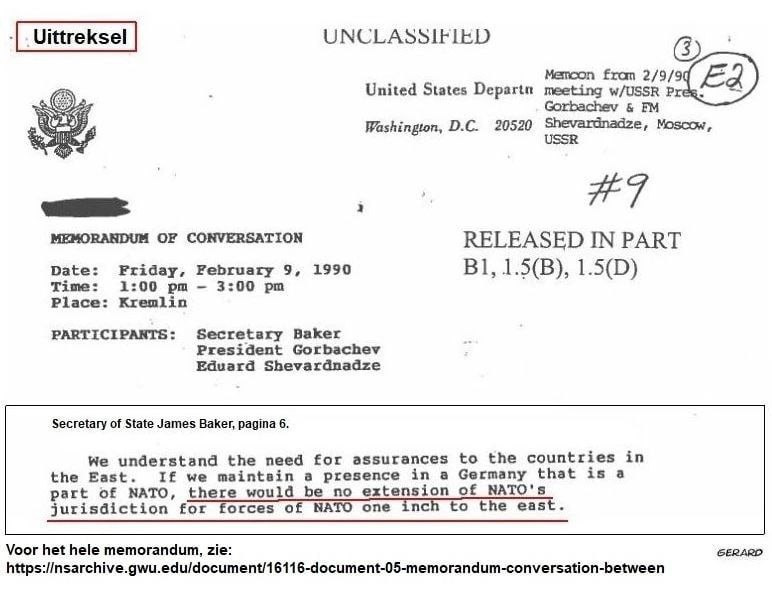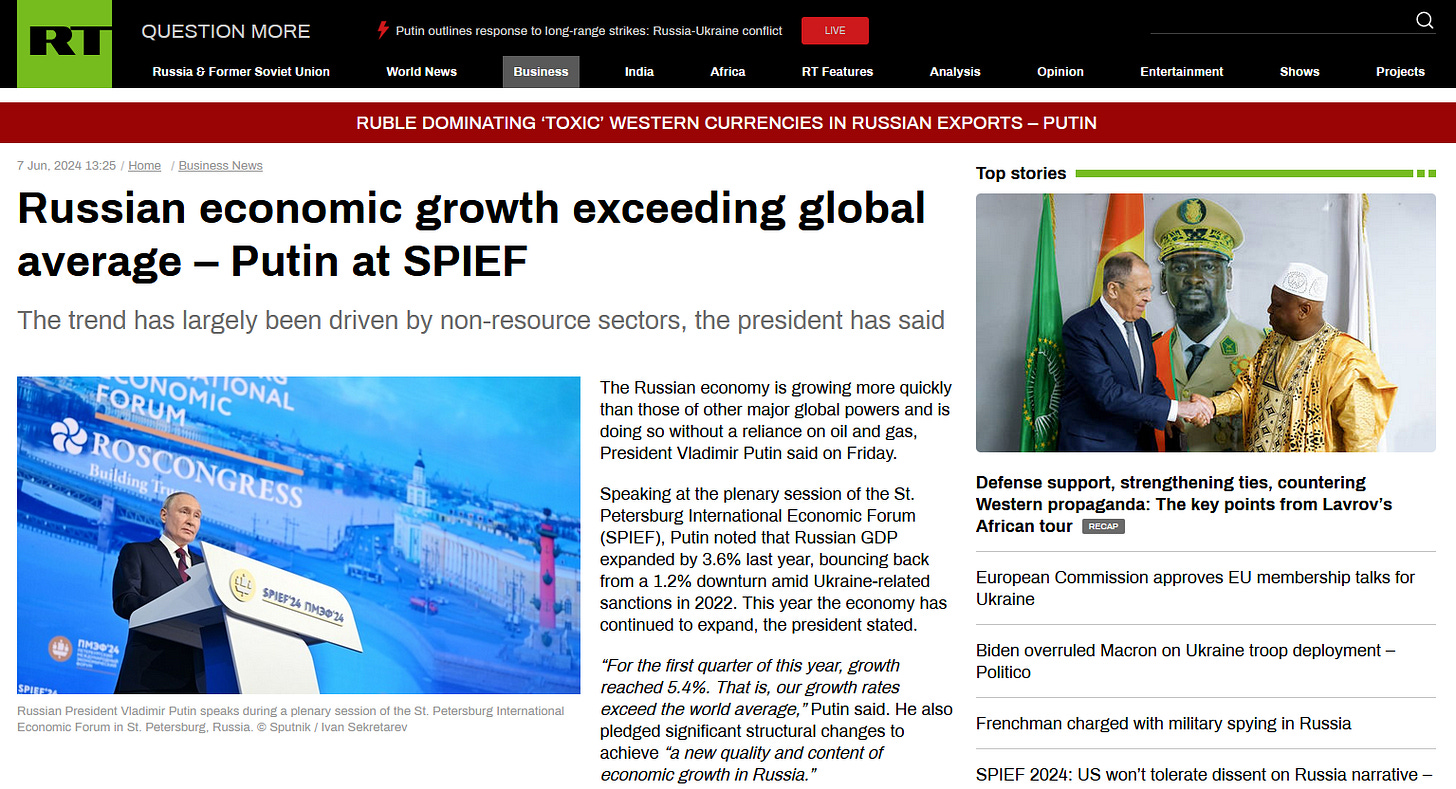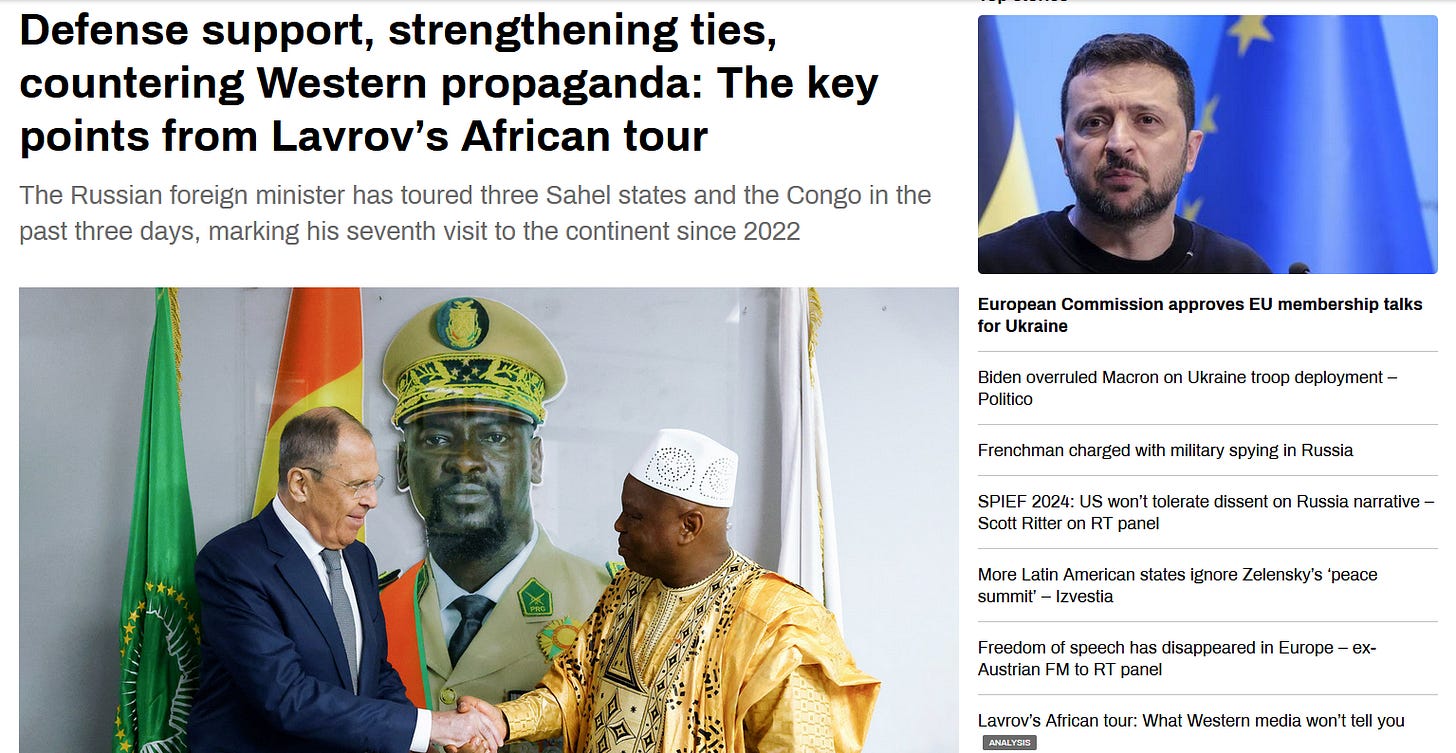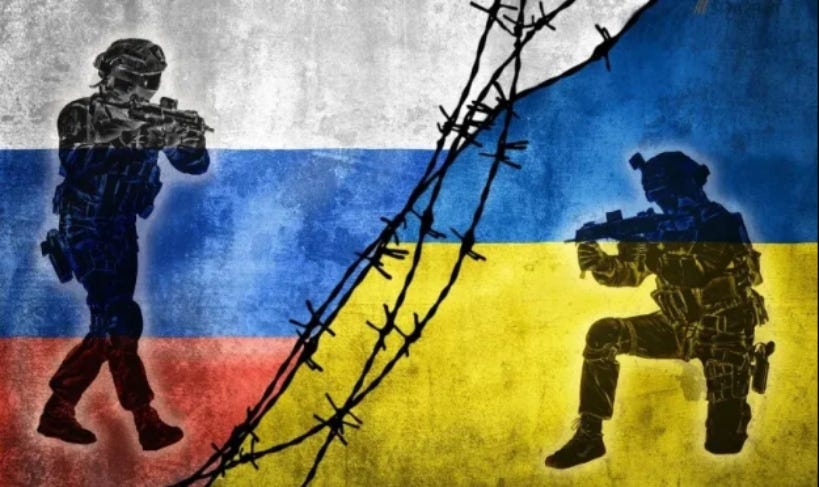RUNNING UPDATES ON THE CONFLICT IN UKRAINE - 08.06.2024
Including geopolitical issues affecting the balance of power in the ongoing end game war to establish our common future, a closely monitored prison planet or tolerance for diverse modes of governance.
THE ROAD TO THE ULTIMATE CONCLUSION OF WORLD WAR III RUNS THROUGH HERE.
Please note: We will be in Indonesia for the next eight days.
Updates will be sporadic and perhaps absent during much of this time.
Our apologies for this alteration to your daily updates.
*** NO MATTER WHAT THE WEST DOES NOW IT HAS LOST TO RUSSIA ***
“Ukraine. What is the truth...?
Why won’t western media tell both sides…?”
VIRTUALLY UNREPORTED ATROCITY IN LUGANSK, 2nd JUNE 2014
A lot has been said about atrocities in the western media claimed to have been perpetrated by the Russians, for example at Bucha and Mariupol among others. These assertions are conveyed on the say so of the Ukrainian authorities. How willing though are western news broadcasters to convey atrocities attributed to the Ukrainians? The following will I think provide the answer.
If anyone wonders if they are receiving accurate coverage of the conflict in Ukraine I would suggest watching the video below of an event which occurred on the 2nd of June 2014 and ask themselves if they recall hearing about it on any mainstream media news channel at the time.
The video is harrowing to watch. The bodies (five women and three men) are real. Yet across western media there was only one single news report that occurred a day later. This was from CNN and occurred only because a CNN team happened to be nearby at the time of the atrocity and so the network could hardly ignore it as all others so obviously did.
The video below shows the unvarnished truth that was not considered newsworthy in western mainstream news.
THE SINGLE WESTERN MSM REPORT ON THE LUGANSK ATROCITY, 3rd JUNE 2014
The video at the CNN link below is the crime scene sanitised by CNN, though played straight with honest reporting on the scene not playing things to Kiev’s tune.
(There was a time early in the war in the Donbass when CNN were not afraid to contradict the Ukrainian regime in Kiev.) Watch, because it's the first and last time you will see this.
5 women and 3 men died, all civilians.
Air attack on pro-Russian separatists in Luhansk kills 8, stuns residents.
COLLECTIVE WEST-UKRAINE <-> RUSSIA
SHAMELESS WESTERN MEDIA IGNORED THIS:
Airstrike in Lugansk - 10 Year Anniversary.
The Heat | The VDV Flag Is Hoisted In Kanal | The Offensive Gains Momentum. MilitarySummary 2024.6.8
ALEXANDER MERCOURIS of THE DURAN: Rus Winning, Hastens Advance, Zelensky Illegitimate; Ukr Chasov Collapse; Ukr Attack Kharkov Fails.
ALEX CHRISTOFOROU of THE DURAN: Biden's apology to Elensky. Putin, US destroys dollar. BRICS blockchain. NATO, Russia everywhere.
Russian economic growth exceeding global average – Putin at SPIEF.
The trend has largely been driven by non-resource sectors, the president has said.
The Russian economy is growing more quickly than those of other major global powers and is doing so without a reliance on oil and gas, President Vladimir Putin said on Friday.
Speaking at the plenary session of the St. Petersburg International Economic Forum (SPIEF), Putin noted that Russian GDP expanded by 3.6% last year, bouncing back from a 1.2% downturn amid Ukraine-related sanctions in 2022. This year the economy has continued to expand, the president stated.
“For the first quarter of this year, growth reached 5.4%. That is, our growth rates exceed the world average,” Putin said. He also pledged significant structural changes to achieve “a new quality and content of economic growth in Russia.”
Putin said the trend stems largely from non-resource-based industries. According to the Russian leader, in 2023 over 40% of GDP growth came from basic industries such as manufacturing, construction, logistics, communications, and agriculture, while some 60% was from supporting industries such as trade, hospitality, and financial services.
He noted that Russia had set a goal of joining the four largest global economies, and had apparently achieved this. According to World Bank estimates released last week, Russia now ranks as the world’s fourth biggest economy based on purchasing power parity, surpassing Japan and Germany. However, according to Putin, the country must not ease off with its efforts to develop the economy even further.
“I would like to note that it is not a matter of GDP estimation and calculation systems… We are somewhere nearby: Russia, Germany, Japan – the difference is small. We are ahead, but the difference is small,” Putin said. It is now vital to “ensure consistently high rates and quality of growth in the long term” to maintain Russia’s position, he added.
Russia has faced multiple rounds of Western sanctions since the start of its military operation against Ukraine in February 2022. The measures have ranged from blacklisting most Russian banks and cutting them from the international SWIFT interbank messaging system, to freezing some $300 billion in Russian foreign exchange reserves. Many analysts have attributed Russia’s steady economic growth in the face of these challenges to its timely pivot to markets in Africa, the Middle East, and Asia, as well as fiscal changes adopted by the country’s financial authorities.
The International Monetary Fund (IMF) in April said it expects the Russian economy to grow faster than all advanced economies in 2024. According to its projections, the country’s GDP is forecast to expand by 3.2%, exceeding the expected growth rates for the US (2.7%), the UK (0.5%), Germany (0.2%) and France (0.7%). Russian Finance Minister Anton Siluanov earlier said he expects GDP growth in 2024 to equal that of last year, while the Bank of Russia has put it at 2.5-3.5%.
Russian economic growth exceeding global average – Putin at SPIEF.
What’s the SPIEF & Why Is It Important?
ANDREI MARTYANOV: On Scott Ritter and Russia Braces as NATO's Desperation Grows.
GEORGE GALLOWAY MP: Zelensky kept in power by men in Nazi regalia.
RUSSIA TODAY - 'CROSSTALK': NATO Escalation with Russia.
RACHEL BLEVINS - MARK SLEBODA: Biden Applauds Russian Deaths + Zelensky Begs Leaders to Attend His Not-Peace Summit.
TUCKER CARLSON - PROFESSOR JEFFREY SACHS: Why the CIA Struggles to Control Putin.
Russian President Vladimir Putin Speaks At Plenary Session Of Saint Petersburg Economic Forum.
GEORGE GALLOWAY MP - GEORGE SZAMUELY: INTERVIEW: Upping the ante. A step closer to WW3.
DANIEL DAVIS - M.I.T. PROFESSOR TED POSTOL: Ukraine Strikes on Russian Nuke Radars Backfires.
GARLAND NIXON: NEOCON GAZA CATASTROPHE - BLINKEN SPY CONNECTIONS - SCOTT RITTER - THE GRAYZONE - WEBSITES ATTACKED.
Why Russian Sanctions Were DOOMED to Fail.
German Chancellor Olaf Scholz’s Big Remark On Ukraine Peace Summit; 'Not Aimed At Ending War...'
Putin Woos NATO Member Turkey, Urges ‘Friend’ Erdogan To Curb Economic Dependence On West.
Macron Dares Putin Again; France To Supply Mirage 2000 Fighters Jets To Ukraine Amid Russia War.
NATO Nation In Panic After Russia's Missiles & Drones Attack On Ukraine; Poland Scrambles Jets.
Ukraine To Get More Munitions For HIMARS, HAWK Air Defence System From U.S.; Russia Says… | Watch:
BORZZIKMAN: The US and NATO Broke Into A Cold SWEAT: Yemen's Houthis Will Receive Modern Deadly Russian Weapons.
The evolution of Russia's thermobaric weapons, A next-gen flamethrower with extended reach.
ISRAEL <-> PALESTINE-IRAN-SYRIA-IRAQ-LEBANON-YEMEN
FBI Whistleblower: Israel Has Corrupted The US Government.
KIM IVERSEN: Why the New Generation Rejects Old Sentiments on Israel.
Free Palestine Activists Interrupt Kamala Harris’ Appearance on Jimmy Kimmel.
Netanyahu STILL Rejecting a Cease Fire.
Tehran Univ. Prof. Marandi Discusses Iran's Endurance and Resilience.
After Netanyahu, Now President Herzog Hints At War Against Hezbollah; ‘Don't Be Surprised If...'
Palestine Protesters Surround White House in Washington D.C. LIVE June 8th.
COLLECTIVE WEST <-> GLOBAL MAJORITY
REDACTED: EVERYTHING is changing for the U.S. dollar and this is the final straw.
GEORGE GALLOWAY MP: INTERVIEW: Whatever happened to ‘President’ Juan Guaidó?
KATIE HALPER: DEBATE! Is Mexico’s New President Claudia Sheinbaum A REAL Leftist?
MULTIPOLARITY - RUSSIA-CHINA / BRICS
SEAN FOO: Saudi Arabia Joins China-Led Digital Currency System As Russia Welcomes Turkey To BRICS.
AFRICA
Defense support, strengthening ties, countering Western propaganda: The key points from Lavrov’s African tour.
The Russian foreign minister has toured three Sahel states and the Congo in the past three days, marking his seventh visit to the continent since 2022.
Russian Foreign Minister Sergey Lavrov has concluded his latest tour of Africa, visiting four countries in two regions of a continent where Western governments have expressed concern about their declining influence in recent years.
The top diplomat began his trip on Monday, first stopping in Guinea before moving on to the Republic of the Congo, Burkina Faso, and finally Chad on Wednesday.
What was the purpose of the tour?
Lavrov’s trip was aimed at assessing the growth in relations between the countries he visited and Moscow, as well as engaging in fresh negotiations he described as “mutually beneficial.”
Last summer, at the second Russia-Africa summit in St. Petersburg, Moscow pledged to strengthen ties with African countries and signed a number of agreements, including on defense cooperation, food security, education, and research.
During his meetings with officials on his tour, Lavrov reiterated the Russian government’s commitment to fulfilling these promises, according to statements released by the Foreign Ministry.
Guinea talks
The Russian foreign minister arrived in Guinea early on Monday, marking his first visit to the West African nation since 2013.
He was welcomed to the capital, Conakry, by transitional president Mamadi Doumbouya, who has ruled the country since taking power in a coup in 2021. The Guinean leader has denounced attempts by Western powers such as the US and France to intervene in Africa’s political challenges as racist and condescending.
Lavrov and his Guinean counterpart, Morissada Kouyate, discussed a variety of issues and agreed for the two countries to collaborate on projects involving geological research, the development of mineral deposits, and health, according to Moscow’s Foreign Ministry.
Defense ties with the Congo
Late on Monday, Lavrov arrived in the Republic of the Congo, with talks focused on defense cooperation and ending the Ukraine conflict.
The following day, during a press conference in Oyo, a city about 400km north of Brazzaville, Lavrov announced that Russia and the Congo will continue their intensive military and military-technical collaboration in the interest of “Congo’s defense capabilities.”
The Congo’s arsenal includes Soviet- and Russian-made weapons such as armored vehicles, rocket artillery, and helicopters. In May 2019, the Russian and Congolese defense ministries signed a contract to send Russian military specialists to the Congo to train and assist the Congolese army in the operation, maintenance, and repair of previously supplied military equipment and special assets.
Lavrov last visited the Central African state in July 2022, when Moscow and Brazzaville explored expanding collaboration in the sectors of energy and mineral resources, along with infrastructure development.
On Tuesday, the top Russian diplomat and his Congolese counterpart, Jean-Claude Gakosso, called for a peace plan for the Ukraine conflict that would include talks between the two main parties involved.
“It seems to me that those who send arms to Ukraine are not advocates of peace. Quite the opposite; they are those who challenge humanity, literally pushing us towards a worldwide conflict,” Gakosso stated.
Lavrov also commended the Congolese president, Denis Sassou Nguesso, for maintaining a “balanced” stance on Russia’s military actions in Ukraine.
Lavrov assesses relations with key Sahel state
On Tuesday night, the minister arrived in Burkina Faso for his first visit in the history of Moscow-Ouagadougou relations. He met with Ibrahim Traore, the West African nation’s interim president, as well as Burkinabe Foreign Minister Karamoko Jean Marie Traore.
According to the Russian Foreign Ministry, the parties agreed to increase their already “strong” bilateral partnership in various sectors, with a focus on expanding cooperation in trade, economics, and humanitarian aid.
READ MORE: Lavrov’s African tour: What Western media won’t tell you
Lavrov commended the Sahel state for being the first to allow Moscow to reopen its embassy as part of Russia’s policy of revitalizing diplomatic missions in African countries. The mission, which had been closed since 1992, resumed operations last December following an agreement reached at the second Russia-Africa summit by interim leader Traore and President Vladimir Putin.
Burkina Faso is one of several former French colonies on the continent that have cut military ties with France in recent years and turned to Moscow for help combating terrorism in the Sahel. Islamic extremism has plagued the region since 2011, when NATO intervened on behalf of insurgents in Libya.
Paris and some of its Western counterparts, including the US, have accused Russia of pursuing predatory projects in Africa and spreading disinformation, but Ouagadougou and its allies, Mali and Niger, have welcomed Moscow as a strategic partner.
On Wednesday, Lavrov told reporters at a joint press conference in Ouagadougou with his Burkinabe counterpart, Karamoko Traore, that the US and its allies have maintained a colonial approach to international relations.
In response to a question on whether Russia intends to “oust” the US from Africa, Lavrov declared that Moscow is only building relations with “friends” on the continent based on mutual interests, benefits, and equality.
A wrap in Chad
When Lavrov traveled to N’Djamena on Wednesday, he emphasized the importance of Russia-Chad relations and encouraged the two governments to focus on strengthening trade, economic ties, and investment interaction.
The diplomat told reporters that discussions with Chad’s foreign minister, Abderaman Koulamallah, had focused on “plans for the future” and the “strategic courses” outlined by President Putin and Chadian leader Mahamat Idriss Deby during a meeting in the Kremlin in January.
”We are developing cooperation in security. Chad is interested in it, considering that the terrorist threats in the region, associated with the destruction of Libyan statehood in 2011, persist,” Lavrov stated.
The foreign minister’s first visit to the Sahel state coincided with the 60th anniversary of diplomatic relations between the former French colony and the Soviet Union, which began in 1964.
It also came less than two weeks after Chad’s president, Mahamat Deby, was sworn in, having won the disputed May 6 election with 61% of the vote.
Mahamat Deby had ruled the landlocked nation since his father, Idriss Deby Itno,’s death and was said to be a close ally to Chad’s former colonial power, France. However, analysts, including Vsevolod Sviridov, an expert at the Center for African Studies at the Higher School of Economics in Moscow, believe the Chadian leader has been warming to Russia in recent months.
While in Moscow in January, Deby described his visit as “historic,” noting that “Chad and Russia have very long-standing relations.”
His visit came nearly six decades after the Central African nation’s former president, Francois Tombalbaye, visited Russia in 1968, according to Deby.
Anti-French sentiment has been growing in Chad, with opposition leaders issuing a joint statement last year demanding that French troops leave the country. Last October, Chadian political analyst Evariste N’Garlem Tolde told RT that the country does not need the French army for security, claiming their presence has resulted in an increase in terrorist activities.
Washington also announced plans to relocate military personnel stationed in Chad in April, after the landlocked nation’s government reportedly questioned whether an existing agreement covered US troops deployed at the only American airbase there.
On Wednesday, Lavrov pledged that Russia will continue to provide the Chadian army with weapons and military equipment to bolster its defense capabilities and ability to combat terrorism in the country, where the previous president, Idriss Deby Itno, lost his life fighting rebels in 2021.

